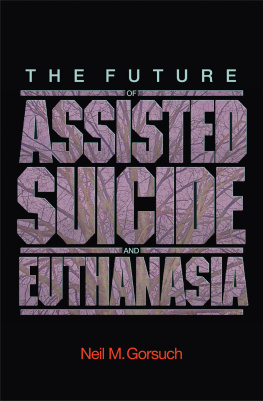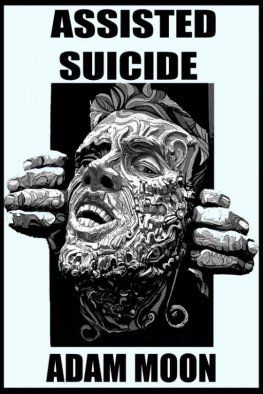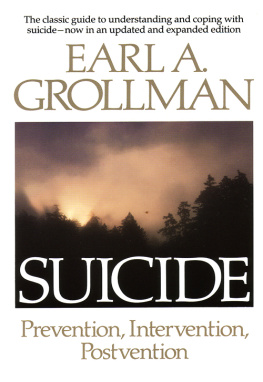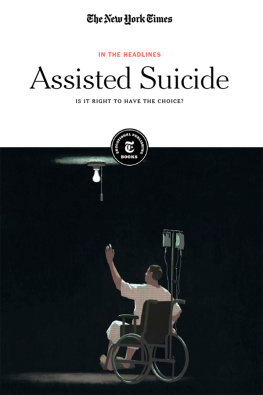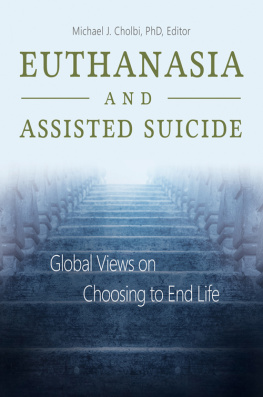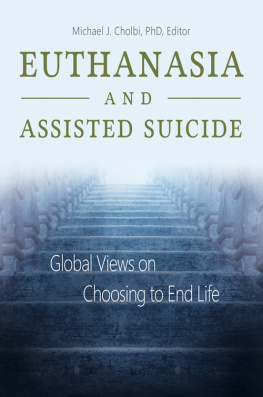
T he Future of
Assisted Suicide
and Euthanasia
NEW FORUM BOOKS | 
| ROBERT P. GEORGE, Series Editor A list of titles in the series appears at the back of the book |
T he Future of
Assisted Suicide
and Euthanasia
Neil M. Gorsuch
PRINCETON UNIVERSITY PRESS
PRINCETON AND OXFORD
Copyright 2006 by Princeton University Press
Published by Princeton University Press, 41 William Street, Princeton,
New Jersey 08540
In the United Kingdom: Princeton University Press, 6 Oxford Street,
Woodstock, Oxfordshire OX20 1TW
All Rights Reserved
Second printing, and first paperback printing, 2009
Paperback ISBN: 978-0-691-14097-1
The Library of Congress has cataloged the cloth edition of this book as follows
Gorsuch, Neil M. (Neil McGill), 1967
The future of assisted suicide and euthanasia / Neil M. Gorsuch.
p. cm.(New forum books)
Includes bibliographical references and index.
ISBN-13: 978-0-691-12458-2 (cloth : alk. paper)
ISBN-10: 0-691-12458-2 (cloth : alk. paper)
1. Assisted suicideMoral and ethical aspectsUnited States. 2. Assisted suicideLaw and legislationUnited States. 3. EuthanasiaMoral and ethical aspectsUnited States. 4. EuthanasiaLaw and legislationUnited States. I. Title. II. Series.
R726.G652006
179.7dc222005052194
British Library Cataloging-in-Publication Data is available
This book has been composed in Minion typeface
Printed on acid-free paper.
press.princeton.edu
Printed in the United States of America
10 9 8 7 6 5 4 3 2
I n memory of
my father
and mother
Contents
Introduction
|
The Glucksberg and Quill Controversies: The Judiciarys (Non)Resolution of the Assisted Suicide Debate
|
The Debate over History
|
Arguments from Fairness and Equal Protection: If a Right to Refuse, Then a Right to Assisted Suicide?
|
Casey and Cruzan: Do They Intimate a Right to Assisted Suicide and Euthanasia?
|
Autonomy Theorys Implications for the Debate over Assisted Suicide and Euthanasia
|
Legalization and the Law of Unintended Consequences: Utilitarian Arguments for Legalization
|
Two Test Cases: Posner and Epstein
|
An Argument against Legalization
|
Toward a Consistent End-of-Life Ethic: The Right to Refuse Care for Competent and Incompetent Patients
|
Appendix A
Certain American Statutory Laws Banning or Disapproving of Assisted Suicide |
Appendix B
Statistical Calculations |
Acknowledgments
T HERE ARE many people to whom I am indebted. John Finnis provided thoughtful comments on, and kind support through, draft after draft. John Keown, Dan Callahan, and Timothy Endicott offered valuable input in many areas and support in seeing this project through to completion. Richard Posner, Richard Epstein, Daniel Klerman, Christian Mammen, and Todd Zubler also took the time to review and offer insightful suggestions on portions of what eventually came to form this book. Bryan and Prue Burletson provided years of encouragement.
Draft portions of the manuscript previously appeared as articles: The Legalization of Assisted Suicide and the Law of Unintended Consequences, 2004 Wisconsin Law Review 1347 (2004), and The Right to Assisted Suicide and Euthanasia, 23 Harvard Journal of Law and Public Policy 599 (2000). I am grateful to both journals for their permission to reproduce what was previously published in their pages. Laura Schulteis and Laura Dickman of the Wisconsin Law Review also made substantial contributions to much of the material that forms the basis of .
I would like to thank Robert George and Chuck Myers of Princeton University Press for their support and interest in this book, as well as Mark Bellis and Anita OBrien for her help in editing the manuscript. Michael Pucci and Tom Humphries provided helpful research assistance, and the Marshall Scholarship Commission made much of the research on which this book is based possible through its generous financial assistance. Yet once again, I am deeply indebted to Bernadette Murphy and Jessica Bartlow for their excellent editorial assistance and unflappable good humor through long hours and days. Despite so much help from so many generous friends and colleagues, I alone am responsible for errors that remain and the views expressed here are, of course, mine alonenot those of any other person or entity.
Finally, and borrowing in part from P. G. Wodehouse, I thank my wife, Louise, and my daughters, Emma and Belinda, without whose constant love and attention this book wouldve been finished in half the timebut without whom life wouldve been half as fully lived.
T he Future of
Assisted Suicide
and Euthanasia
Introduction
W HETHER to permit assistance in suicide and euthanasia is among the most contentious legal and public policy questions in America today. The issue erupted into American public consciousness on June 4, 1990, with the news that Dr. Jack Kevorkiana slightly built, greying, retired Michigan pathologisthad helped Janet Adkins, a fifty-four-year-old Alzheimers patient, kill herself.
Since Janet Adkinss death first made national headlines, Dr. Kevorkian claims to have assisted more than 130 suicides.
While perhaps the most notorious contemporary American proponent of assisted suicide and euthanasia, Dr. Kevorkian hardly stands alone. In 1984 the Netherlands became the first country in the world to endorse certain forms of assisted suicide and euthanasia. The Dutch Supreme Court declared that, although euthanasia was punishable as murder under the nations penal code, physicians could claim an emergency defence under certain circumstances.
Within the United States, Dr. Timothy Quill, a University of Rochester professor, provoked early debate on the assisted suicide question in 1991, writing an article in the New England Journal of Medicine discussing and defending his decision to prescribe barbiturates to a cancer patient, even though she admitted that she might use them at some indefinite time in the future to kill herself.
In 1992 a gynecology resident submitted an anonymous article to the Journal of the American Medical Association that was the subject of a long-running debate in prominent American medical journals. Entitled Its Over Debbie, the article described how the author administered a lethal injection to a terminal cancer patient (an act of euthanasia, not assisted suicide), whom he had never previously met, after her plea to get this over with.
After its publication in the early 1990s, the Hemlock Societys book, Final Exit, quickly rocketed to the New York Timess best-seller list. With more than a half million copies sold, it provides step-by-step instructions (in easy-to-read large print) on various methods of self-deliverance. In February 2006 its sales on
The public discussion sparked in the early 1990s by Kevorkian, Quill, Final Exit, and Dutch practices quickly matured into a growing debate in academic circles. By the mid- to late 1990s, thinkers from a variety of moral and philosophical perspectives began publishing books pressing the case for legalizing assisted suicide and euthanasiaincluding Ronald Dworkin in 1993,
Next page
